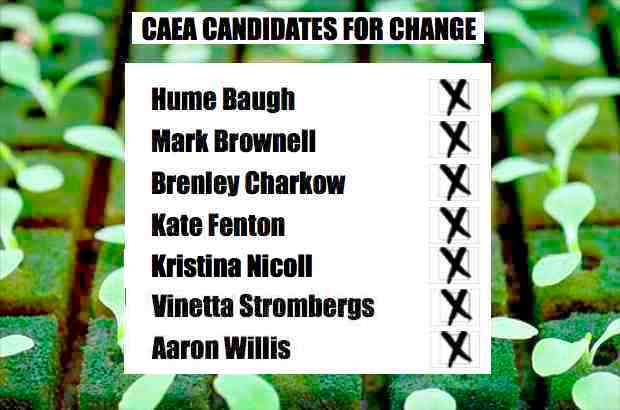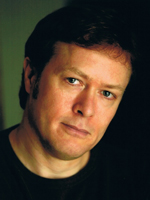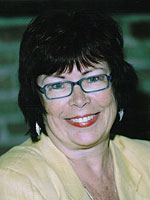Today is the last day for voting in the CAEA elections: meet some of the candidates
by Aislinn Rose
I recently had a conversation with four of the seven Ontario candidates we are endorsing in the current CAEA elections. Voting continues today until 5pm PT.
In attendance: Hume Baugh, Mark Brownell, Vinetta Strombergs and Aaron Willis
WHO ARE THESE PEOPLE?
AISLINN: To get the conversation started, could you go around the table and tell me who you are, what your relationship with Equity is?
HUME: I’ve been a member since 1984, so that’s something like 28 years. I’ve done lots of different things and have worked for larger companies, but I’ve also spent a fair bit of time over the years doing smaller indie theatre and have observed for years that it’s been difficult, next to impossible in many cases to do it without interference from Equity, which is always too bad.
What really got me interested in Council is what happened to me in December when I and three other people tried to produce one of my own plays and it was a nightmare of being forced by Equity to use a higher level of a contract than I could afford to do, and just feeling like there was no way to have any dialogue, and a staff member refusing to meet with me when we reached an impasse. I was outraged.
The issue of indie theatre and the issue of the kind of communication that’s happening with the association is really what got me interested in being on council.
AARON: I’ve been an Equity member for ten years. I got hooked into thinking about Equity Council similarly to Hume, when I was starting to create as an indie theatre producer and having similar difficulties and conversations. Basically being dictated to about what should or shouldn’t happen, and then having to sign agreements that didn’t reflect anything about the way that the work was being created.
Rather than running for Council I ran for the CPAG, the Council Policy Advisory Group, in the last term, and I was co-chair of that with Brenley Charkow. Sitting on the CPAG gave me a real picture of how Equity works from the inside. At the end of those three years, I thought this is a severely dysfunctional organization that doesn’t represent its members very well at all. I thought that means it’s actually time to run for council and try to do something about it.
VINETTA: I’ve been a member of Equity since the dawn of time, since the beginning of the alternate theatres. I go back to the 70s. I’ve been on Council before Policy Governance, and I got involved with fighting Equity, because that’s what it’s been, since the late 80s with the original group trying to get the equivalent of festival waivers for Rhubarb.
It was those next wave of small theatres, which was the first wave since the original theatres in the 70s. They were fighting Equity to find a way to do mostly the play development festivals like Rhubarb. The Fringe was in there too, so there was a group of us, who basically did what we did this time around, to get the indie agreement negotiation started, we invaded an Annual General Meeting and we put a motion on the floor. After that negotiation started, every time we showed up at Equity to negotiate, there was a different group of people across the table, even different staff members.
MARK: I’ve been a member since 1988. I picked up from Vinetta with the Indie in the 90s with Naomi Campbell. The Council at that time had a lot more control over what was going on and I think there was more of an indie-friendly council back then because they recognized there was a problem. In fact, I think Equity has sort of been realizing there has been a problem that needed to be solved, but there’s always somebody there to sort of block it along the way.
I was the one who initiated the resolution that passed 96 – 1. It was basically a bunch of us who invaded the Annual General Meeting… which hadn’t received quorum the last two times, by the way, so they could pass two or three years of minutes. So they were actually pretty happy. They kind of thought, oh, maybe we should engage the indie on this, even though I don’t think they had any idea or intention to fix anything… they were just happy that people were interested. Of course, the people who are interested have pitchforks…
ON AGMS AND VOTES FOR CHANGE
MARK: At that time Equity was blind, deaf and dumb to anything indie. You go back to previous minutes of previous councils and they had no idea what was going on. It really hit them, it was a blind side…
HUME: About what?
MARK: About any kind of dissatisfaction within the indie. It’s been brewing for 20 years…
HUME: But there’s been so much fighting with indie artists…
MARK & VINETTA: But that’s not Council…
AARON: That’s one of the things that came up is this gulf between staff and council…
MARK: It’s huge…
AARON: I said this at the all-candidates meeting: Staff represents Equity, Council doesn’t. When the Indie Caucus started bringing this stuff up, councillors were saying “why didn’t anyone come to us?”. But nobody knows who you are, no one knows who council is, and when you call Equity you deal with a staff member. That’s who you talk to.
MARK: I have to mention at the Montreal AGM a couple of years ago, we put forward yet another thing that passed again. Zach Fraser was involved in that, and Sarah Stanley… it was basically a reaffirmation of my mine, and Walter Massey stood up, one of the original members of Equity, and I thought oh Christ, here it comes… and he stood up and said “we’ve been facing this problem for a long time and we need it to be fixed”…
AARON: wow…
MARK: One of the original members of Equity said that. And all the people who were against it couldn’t vote against it. They were ready to vote against it. We only had a quorum of about 50 people in Montreal, but suddenly all those councillors who were so dead set against it could not stand against this man who had actually created the union. I was shocked. It was a really wonderful night.
SURVEYS AND PATERNALISM
AISLINN: You mentioned being involved in the writing of the current indie policy and I want to talk about this notion of getting great people working in a room together on what a new agreement should look like, and then this history of these draft agreements moving behind closed doors and what comes out is very different to what went in. Do you see that happening again?
VINETTA: I don’t have a lot of faith in how they are portraying the results of the survey. If you say to people, “Hume, would you rather work for Equity minimum, or work for less?” Duh. Of course, we know what the answer is. However, if you have an opportunity to work on a project you believe in, are you willing to work for less? Yes. But they will skew that result and say, “oh, 98% of the people said they want to work for minimum… and only 78% said they were willing to work for less”.
The point is, nobody says you HAVE to work for less, but they say you CANNOT. So they are preventing people from working, which I believe is unconstitutional. And I’m not talking Equity Constitution. They’re preventing us from doing the work we want to do. And the work that charges us, that makes us better, that fulfills us.
AISLINN: There’s been a lot said about the survey and the poor questions that were asked, because obviously the preference is to work for minimum fees. But I feel there were some very clear results that came out of the survey in terms of what many artists value more than minimums, like the opportunity to work with certain artists, creating stuff that’s their own.
MARK: Aislinn, that is where your document comes in very very handy. Because we now have a benchmark. When the new Indie and Co-Op comes out we can compare the two and say here’s where it meets and here’s where it doesn’t meet the survey results.
AARON: This thing about taking stuff behind closed doors, the first I’d heard publicly at all that there was going to be a new Co-Op and a new Indie was when Kerry Ann mentioned it on Facebook.
Kris Joseph did this great job leading the Independent Theatre Review Committee and now he’s saying “I’ve seen a draft of the agreement Arden is working on”. So Arden’s doing it herself.
I think it comes down to contempt for artists, saying “we know better than you”…
VINETTA: … you mean “hobbyists”…
MARK: There’s a paternalism.
AARON: “We know better than you about how you should do your business and how you should create your art. We’re here to protect you from yourselves.” And I find that deeply insulting. There are so many artists who are entrepreneurial and we need an association that supports that and doesn’t squelch it.
MEMBERS WHO LIE
AISLINN: In the survey there was a number, something around 25% of the respondents, admitted to having lied to Equity about work they had done…
MARK: That’s low… that’s a low figure…
HUME: The lying isn’t new though… it might just be increasing…
MARK: We had a wonderful AGM at Passe Muraille as part of the CPAG a couple of years ago. We didn’t really intend it, but we suddenly had a whole panel that stood up and said “I lie, I lie. You’re telling me I have to do it this way and I can’t afford it so I lie”. And suddenly people in the audience started standing up and saying “I lie too”. At that point I was shaking my head and asking, at what point are these agreements totally pointless? If people are lying, if they’re having to bend the rules every time… and it’s not just members, it’s Equity itself shuffling all these productions into the Co-Op.
AARON: Equity would like to be the gateway to professionalism. You get your Equity card and that means you’re a professional artist. But that’s not true. There are lots of people who create stuff and make a living and who aren’t Equity and don’t need to be.
HUME: You also have these individual artists who decide they want to get together to do a project. Maybe one of them got an OAC grant, so now all of a sudden this person has to become an engager. Equity is constantly pitting its membership against each other.
The whole first 20 years of my career we’ve kind of accepted that this is way Equity is and you just have to fight or lie, but in December it was absolutely insane that when I was producing a show the only organization I had trouble with was my own association, that’s crazy to me. I pay my dues, and I spend this whole time being treated like a criminal, or a shifty kind of person.
MARK: I belong to four associations. Equity is the only one I don’t feel has my back.
WHAT THE HELL IS POLICY GOVERNANCE?
AISLINN: You were saying before that there’s a disconnect between members, council and staff, that council is out of the loop. As four of the seven looking to fill the seats in Ontario, if you get elected, what do you want to do to change that?
MARK: Policy Governance is the biggest barrier between Council & membership.
AISLINN: Can I stop you there, because I wonder how many members know what the hell that is?
AARON: Essentially, Council cannot tell staff what is good or not good about an agreement. If some of us get on Council, people who have worked in this way and have useful things to say about what is good or useful in an agreement… all we can do is write policy that Arden will interpret to fix the thing she’s writing.
There’s this idea in Policy Governance, that Council only looks at the Big Picture, not at the details. And then Council has to speak in one voice and present a united front, as opposed to advocating for specific things that need to happen.
What I would like to do once this new indie agreement comes out, if issues come up, I will say “I think there are things that need to be changed”, even though, technically under policy governance I’m not supposed to do that.
MARK: That’s how we can represent the membership.
HUME: I can’t imagine if I was elected, thinking about doing anything else. How would you be able to sit there is somebody brought forward something you disagree with and not say “I disagree”?
MARK: When the door is closed and you’re in Council, you speak your mind. The moment there is a decision made by Council, all Council is supposedly in agreement.
VINETTA: I’ve been asking around in the community and various organizations to get a sense of what others think of Policy Governance and they say it’s for the corporate world, and it doesn’t even necessarily work there.
AARON: It prevents the people who are elected from actually communicating with the membership.
Jason Chesworth [one of the other Ontario candidates] wrote a great piece on facebook about all the things he would do as outreach to membership, and under Policy Governance, he wouldn’t be able to do any of those things.
MARK: One of my biggest interests is advocacy, but under Policy Governance I can’t do it. I can only put it into policy to make Arden/staff do it. But Advocacy should be a core value.
WHAT EQUITY COULD BE
AARON: As an organization that is not a union, but something that represents a bunch of self-employed contractors, what Equity’s role could be in helping the ecology of theatre grow is finding ways to not just defend us as workers, but to also advocate, defend and encourage us as entrepreneurs.
A trade association is a bunch of members working together to grow and prosper, and Equity could be leading that.
MARK: It all comes down to pride in membership. Equity should be bending over backwards so that members finally say, “I’m proud to be an Equity member”. Currently that’s not the case. That is Equity’s main challenge.
Follow Aislinn on Twitter: @AislinnTO










Thank you, Praxis, for doing this. It’s not lost on me that, while we debate (on Facebook), the merits of social media and “getting our message out there”, you’re just going ahead and doing it.
I hope that all four of these excellent Candidates get elected (I voted for them!). In fact, I’d be happy to see the entire list that you’ve endorsed making it to Council (though, I save a vote for myself and a Candidate with whom I disagree with on certain issues). The conversation is more important, at this point, than who gets to volunteer on Council vs. who gets to volunteer for committee.
I feel very confident that those of us who want change will be well represented on the next Council.
Thanks so much for being a part of this discussion Jason. Your name has often come up in our conversations (as it did in this interview) as another excellent candidate, so I wish you the best of luck. The association is fortunate to have so many great people willing to put themselves forward for these roles over the next three years.
This is really a nice place.